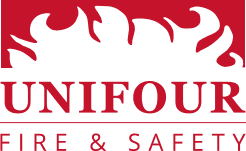
Fire Hydrant Inspection for Commercial Buildings
When a fire breaks out in your building, fire protection — including fire sprinklers and kitchen fire suppression systems — engage automatically in fighting the blaze. When these systems aren’t enough, you count on the fire department to put out the flames completely with their powerful hoses. This requires a working fire hydrant on your property that a fire truck can tap into.
Are your fire hydrants in good working order? The National Fire Protection Association requires annual inspections to make sure this is the case.
If it’s time to have your fire hydrants inspected, contact Unifour Fire & Safety today to schedule services. We provide fire hydrant inspections for businesses throughout the Southeast.
Why Do Fire Hydrants Require Inspections?
Fire hydrants are subject to many problems, including:
- Wear and tear
- Rust and corrosion
- Accidental damage
- Vandalism
- Mechanical malfunction
- Accidental closing of hydrant tap valves
While you hope your building never experiences a fire, regular fire hydrant inspections help you detect and repair any damage that could prevent it from working when you need it most. The time and effort to arrange annual fire hydrant inspections is a small price to pay for the peace of mind that comes from knowing your hydrants will perform properly and reliably if you need it in an emergency.
What Happens During a Fire Hydrant Inspection?
According to NFPA 25, fire hydrants should be inspected annually and after use. At Unifour Fire & Safety, our fire hydrant inspection procedure is designed to thoroughly check that your property’s fire hydrants meet all codes.
Here are the types of checks we perform during each inspection:
Assess Fire Hydrant Locations
Hydrants should be plotted correctly on water district maps. We note any errors and take steps to correct them. Hydrants should also be easily accessible and visible from all directions. No obstructions should interfere with approaching the hydrant or coupling hoses to it.
Test the Fire Hydrant
The most important part of a fire hydrant inspection is the flow test, which determines water availability for fighting fires. Here’s what the test entails:
- Install a pressure gauge in preparation for the flow test.
- Open the fire hydrant fully and let the water flow for at least 60 seconds. This disperses foreign material from the water line and allows the fire hydrant to operate smoothly for an accurate pressure reading.
- Stop the flow of water and assess whether the fire hydrant drains correctly.
- Record data from the pressure gauge to determine whether it meets NFPA standards.
Inspect the Fire Hydrant
After the flow test is complete, our crew carefully examines the fire hydrant and its parts. We include the following in our inspection:
- Clean and lubricate cap threads and chains. Replace missing or cracked caps.
- Make sure valves open and close easily. Tighten leaky valves and report any valves that are difficult to operate or don’t open and close fully.
- Touch up chipped paint or rusted areas with aerosol paint. Make sure any necessary markings and curb spray paint are present and easily discernible. Report hydrants that are in severe need of repainting.
Benefits of Annual Fire Hydrant Inspections
Make fire hydrant inspections a priority for your Southeast business to enjoy:
- Improved safety and peace of mind, knowing your building is protected by a functional fire hydrant.
- Insurance coverage and potentially lower monthly premiums.
- Code compliance and the chance to avoid costly fines and penalties.
Call Unifour Fire & Safety for Fire Hydrant Inspections in the Southeast
For over three decades, we have been the company to call for fire hydrant inspections! One of the main reasons your neighbors have been trusting Unifour Fire & Safety for over 30 years is because we are a one-stop shop for fire protection services in the Southeast. Our knowledgeable fire safety professionals specialize in all aspects of fire protection, including:
- Fire sprinkler systems
- Fire extinguishers
- Fire alarm systems
- Commercial kitchen fire suppression
- Backflow preventers
- Fire hydrants
- Emergency lighting
If you’re ready to schedule a fire hydrant inspection, contact Unifour Fire & Safety today!
Frequently Asked Questions
Our Service Area
We proudly provide fire protection services in the following cities and their surrounding areas:
North Carolina (NC): Charlotte, Greensboro, Greenville, Hickory, Raleigh, and Durham
South Carolina (SC): Charleston, Columbia, Greenville, and Spartanburg
Georgia (GA): Athens, Atlanta, and Savannah
Unifour Fire & Safety is also licensed in Maryland, Virginia, West Virginia, Tennessee, Alabama, and Florida.
Contact us online or call 866-511-5540 for fire protection services throughout the Southeast!
 Click to Apply
Click to Apply 


 Contact Us
Contact Us Call:
Call: 